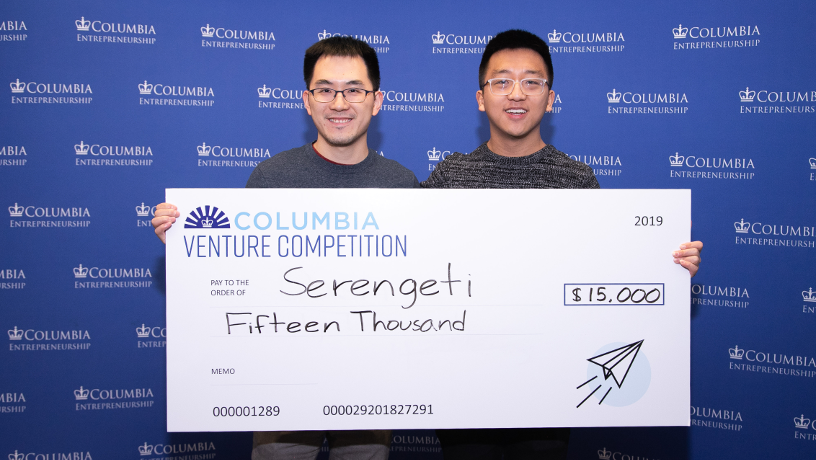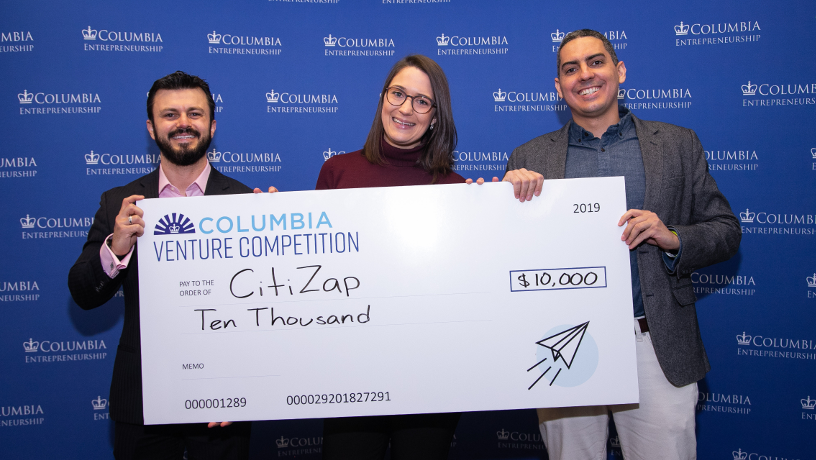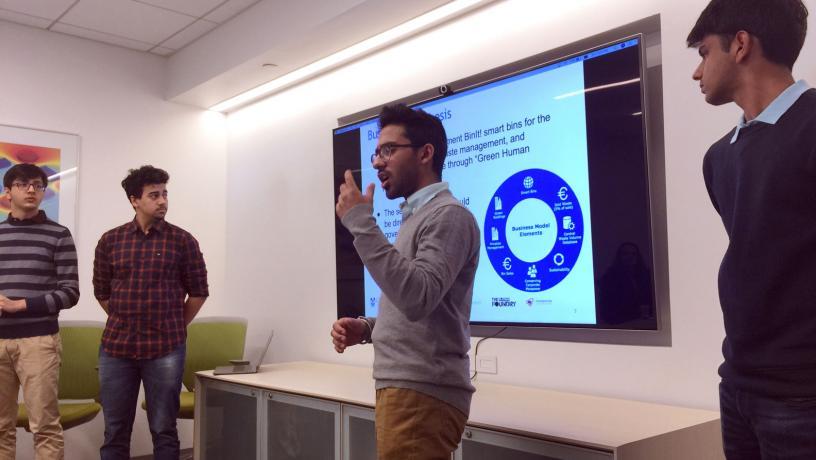Enlightened Enterprise
Columbia Venture Competition highlights startups with a pro-social focus

Serengeti, a startup which uses artificial intelligence to aggregate and share data, ultimately earned second place at the Columbia Engineering sponsored Technology Challenge.

Citizap earned third place and $10,000 for a new AI-powered virtual assistant that connects people in need with nearby public agencies.
Every day, the “data gap” expands: large companies can both collect and leverage information more quickly than smaller competitors, accruing an ever-widening advantage. But what if small and mid-sized companies could band together and pool their data?
Such was the inspiration behind Serengeti, a startup from Jie Feng PhD’17 and George Liu ’17CC, which uses artificial intelligence to aggregate and share data among companies not directly competing against one another. The founders took their collective approach as a means to level the playing field.
“The leaders in every industry increasingly have an unfair advantage in terms of access to data and in-house machine learning talent,” Feng said.
Ideas for building fairer markets and societies motivate many of Columbia’s engineers and entrepreneurs; this spring it emerged as a central theme at the university’s annual two-day celebration of entrepreneurship, where Serengeti and a host of student teams headlined the Columbia Venture Competition while an array of accomplished experts came together for the #StartupColumbia festival.
Participating in the Columbia Engineering sponsored Technology Challenge, the Serengeti team ultimately earned second place alongside fellow winners creating pressure-sensitive robots and implants that continuously generate therapeutic agents. Feng and Liu plan to devote their $15,000 winnings to helping a wider range of clients better connect with online audiences.
Columbia Engineering students pitched winning ideas with a social benefit in many of the competition’s other tracks. BinIt, a startup looking to address environmental justice, took third place in the undergraduate challenge sponsored by Columbia College. Formed during last semester’s India Design Challenge, the young company is creating smart trashcans to automatically sort refuse for easier recycling and disposal.

From left Ishaan Chandratreya '22, Ketan Jog '22, Ajit Akole '22, and Raghav Mecheri '22 presenting BinIt at the India Urban Design Challenge, where the team got their start. BinIt went on to a third place showing at the university-wide Columbia Venture Competition.
Securing a spot on this podium was massive for us. We now have the financial resources to help protect our intellectual property and are able to fund our initial round of manufacturing.
“Perhaps the biggest benefit that BinIt provides is that it would eliminate the need for people to have to physically pick apart and segregate waste, which will lead to less trash and recyclables ending up on city streets and in overflowing landfills,” said Raghav Mecheri ’22, who founded the firm with Ajit Akole ’22, James Bollas ’22, Ishaan Chandratreya ’22, and Ketan Jog ’22CC.
As finalists in the design challenge, the team traveled to India in January to meet fellow entrepreneurs and conduct market research. The group plans to use their latest $10,000 prize to deploy smart trashcans for testing across India this summer.
“Securing a spot on this podium was massive for us,” Mecheri said. “We now have the financial resources to help protect our intellectual property and are able to fund our initial round of manufacturing.”
Competing in the Public Policy Challenge sponsored by the School of International and Public Affairs, Citizap—whose team includes Felipe Rocha ’19—earned third place and $10,000 for a new AI-powered virtual assistant that connects people in need with nearby public agencies.
Prizes were announced throughout the daylong #StartupColumbia festival on April 5, where entrepreneurs, investors, scholars, and more explored how creative innovation fosters social justice—from helping ex-cons reintegrate into society to extending loans to undercapitalized enterprises without access to credit in developing nations.
“If you actually believe in long-term value, and not just the next quarter, then it is impossible to look at the financial bottom line alone,” Deval Patrick, managing director of Bain Capital Double Impact, told the crowd. The former governor of Massachusetts sat down with Cheryl Dorsey, president of the global social impact fund Echoing Green, for a fireside chat at the end of the festival.
“For a long time the private sector was on the sidelines—a lot of people in business thought it was up to government and the philanthropic sector to deal with issues of social and economic justice,” said Patrick. “But more and more entrepreneurs and business leaders are understanding that they have a role to play too, and more and more customers and consumers and citizens are now insisting that businesses step up.”
